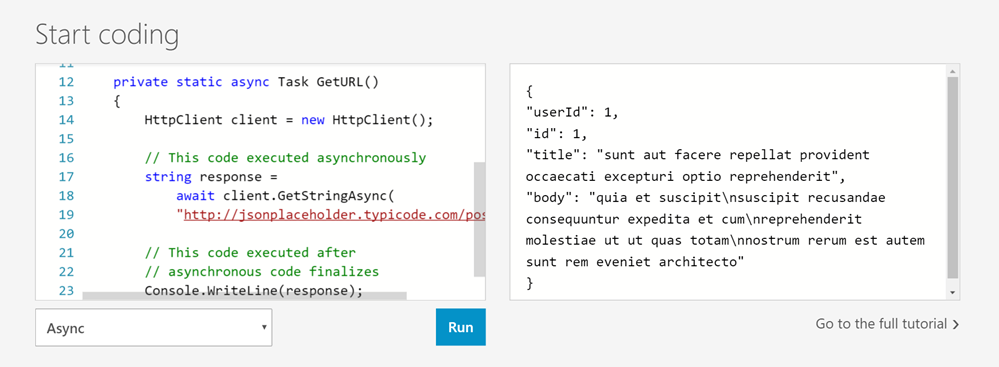
I feel like it's the culmination of all these years of work in .NET and Open Source. This is why I came to work at Microsoft; we wanted to open source as much as we could and build a community around .NET and open source at Microsoft. 15 years and the work of thousands of people later, today we released .NET Core 1.0.
Take a moment and head over to http://dot.net and check out the download page. It's got a really nice place you can try out C# directly in the browser without having to install anything! There's also a great C# Tutorial with interactive browser-based tools as well.
.NET Core 1.0 runs on Windows, Mac, and several flavors of Linux including RedHat Enterprise Linux and Ubuntu. It supports C#, VB, and F# and modern constructs like generics, Language Integrated Query (LINQ), async support and more. The Core Runtime, libraries, compiler, languages and tools are all open source on GitHub where contributions are accepted, tested and fully supported.
Getting started with .NET Core
- If you use Visual Studio 2015 (and remember, Visual Studio Community is free!) you should get VS2015 Update 3 first then install the .NET Core Tools for Visual Studio.
- If you don't want to use VS, consider using Visual Studio Code for free and install the C# extension from the marketplace to get a great code editing experience along with the .NET Core SDK for Windows. Of course, if you're on Mac/Linux/Whatever, go over to http://dot.net and download whatever's right for you!
- If you want all the advanced and specific downloads for .NET or .NET Core, there's a table here.
What is .NET Core? Here's some details from the .NET Blog:
.NET Core is a new cross-platform .NET product. The primary points of .NET Core are:
- Cross-platform: Runs on Windows, macOS and Linux.
- Flexible deployment: Can be included in your app or installed side-by-side user- or machine-wide.
- Command-line tools: All product scenarios can be exercised at the command-line.
- Compatible: .NET Core is compatible with .NET Framework, Xamarin and Mono, via the .NET Standard Library.
- Open source: The .NET Core platform is open source, using MIT and Apache 2 licenses. Documentation is licensed under CC-BY. .NET Core is a .NET Foundation project.
- Supported by Microsoft: .NET Core is supported by Microsoft, per .NET Core Support
.NET Core is composed of the following parts:
- A .NET runtime, which provides a type system, assembly loading, a garbage collector, native interop and other basic services.
- A set of framework libraries, which provide primitive data types, app composition types and fundamental utilities.
- A set of SDK tools and language compilers that enable the base developer experience, available in the .NET Core SDK.
- The ‘dotnet’ app host, which is used to launch .NET Core apps. It selects and hosts the runtime, provides an assembly loading policy and launches the app. The same host is also used to launch SDK tools in the same way.
Blogs
Here are the major blogs carrying the announcement.
- Announcing .NET Core 1.0
- Announcing ASP.NET Core 1.0
- Visual Studio 2015 Update 3 and .NET Core 1.0 Available Now
We are also releasing .NET documentation today at docs.microsoft.com, the new documentation service for Microsoft. The documentation you see there is just a start. You can follow our progress at core-docs on GitHub. ASP.NET Core documentation is also available and open source.
Have fun!
Sponsor: Build servers are great at compiling code and running tests, but not so great at deployment. When you find yourself knee-deep in custom scripts trying to make your build server do something it wasn't meant to, give Octopus Deploy a try.
© 2016 Scott Hanselman. All rights reserved.




